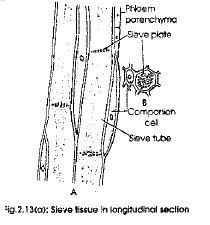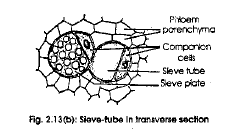2.2.1 Introduction
In all multi-cellular organisms, be it a plant or an animal, the important features is ‘division of labour’ which means sharing of functions. A group of cells having a similar structure and a common function is called a tissue.
2.2.2 Types of Tissues
The plant tissues are broadly classified into two types.
(A) Meristematic tissue: Plants continuously produce tissues and organs unlike animals.
The tissues which are perpetually young and endowed with the capacity of cell division are called meristomatic tissues. Based on their location and function, meristems are classified into – (i) Apical merstems, (ii) Lateral meristems and (iii) Intercalary meristems.
(i) Apical meritems: This type of meristem is found at the tips of the stem and the root. Cells of the apical meristem cause increase in the length of plant body.
(ii) Lateral merstems: The includes the meristematic tissues occupying the lateral regions of the stem which bring about increase in the width and girth of the plant body. E.g., cork cambium.
(iii) Intercalary meristems: These meristems occupy base of the leaves and the base of the internodal regions n plants such as grasses (mostly in mono – cotyledonous plants). These help in elongation of the internodes.
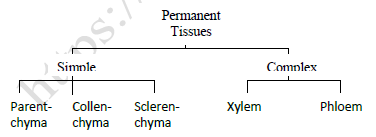
(B) Permanent tissues: The cells of permanent tissues do not normally divide. They have definite structure and function. They are differentiated into various types to perform
different functions. The permanent tissues are classified into (a) simple tissue, (b)complex tissues.
Simple tissues include parenchyma, collenchyma and sclerenchyma. Complex tissues include the vascular tissues – xylem and phloem.
1. Simple tissues
(i) Parenchyma: the cells of walled, with intercellular spaces and are usually intercellular spaces and are usually located at the softer parts of the plant.
Parenchymatous cells can be come meristematic and then can divide and red vide.
There are specialized parenchyma cell such as chlorenchyma containing chloroplast to perform photosynthesis, aerenchyma having air-spaces in between the cells, present in aquatic, plants that help the plants to float in water.
In general, the parenchyma serve to store and conduct food materials, water and materials, water and minerals.
(ii) Collenchyma: The cells of cross-sections and have unevenly thickened walls. These thickenings are due to the deposition of more cellulose and pectin. The main function of collenchyma is to provide strength and flexibility to the growing organs like young stem.
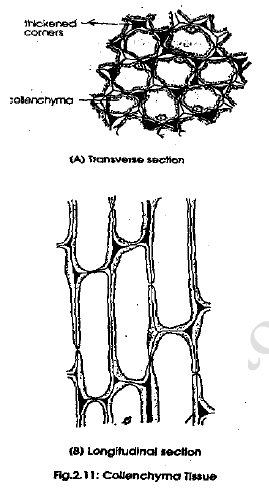
(iii) Sclerenchyma: This is a dead tissue. The cells they are thick with lignified walls. They give mechanical support to the organs. This has two types of cells – sclereids and fibres. Sclereids are stone cells which are commonly found in shells of the nut, pulp of certain fruit such as pear, sapota, guava, etc. The cells are very thick walled, had and strongly lignified and irregularly shaped (Figure 2.12(b)).The grittiness of the pulp in certain fruits like pear is due to the presence of sclereids. The fibres are long elongated strands the simple pits throughout its length, which are equally found, associated with the vascular tissues (xylem and phloem). The fibres associated with phloem are also known as bast fibres.
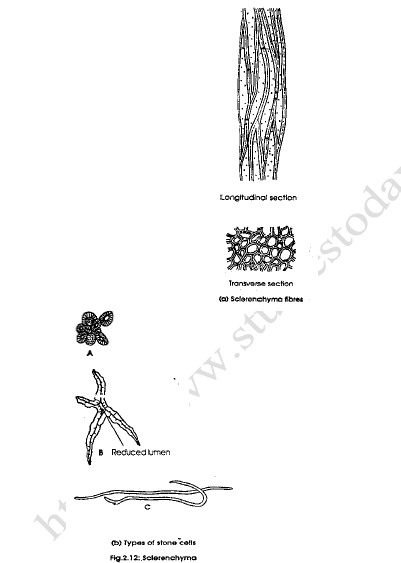
II. Vascular tissues: This tissue helps in transport of nutrient, water and food materials to different, parts of the plant body. Hence, the are called conducting tissues of the plant. The two kinds of vascular tissues are xylem and phloem.
(a) Xylem: This is mainly concerned with transport of nutrients, water and minerals upwards n the plant body. It forms a continuous tube through the roots, stems, leaves, flowers and fruits by the fusion of elongated cells. The conducting cells of xylem are called tracheary elements which are of two types – tracheids and vessel members. The tracheids are predominant in lower vascular plants whereas the vessel members are predominant in flowering plants. Tracheids are elongated cells with topering or chisel-like ends. The walls of the xylem vessel are lignified in order to prevent the tube from collapsing. Certain areas in the xylem vessels are not thickened which are called pits. Through these pits the adjoining xylem vessels conduct water thereby forming a continuous conducting system.In addition to conducting elements xylem contains xylem parenchyma (living cells) and xylem fibres (dead cells). The xylem parenchyma cells are involved in transport of substances and the xylem fibres give mechanical support to the xylem vessels.
(b) Phloem: The phloem is mainly concerned with transport of food and other organic substances to various parts of the plant body. The conducting cells of phloem are called sieve element which are of two types – sieve cells and sieve tube members.The sieve cells are present in lower vascular plants whereas the sieve tube members tube members are associated with specialised parenchyma cells called complain cells. Companion cells, probably regulate the activity of sieve tube. Companion cells are found in association with sieve tube elements in Angiosperms. In Gymnosperms, instead of companion cells, albuminous cells are associated with sieve tubes. In addition to sieve tube members and companion cells phloem consists of phloem parenchyma and phloem fibres. Phloem parenchyma serves to store the food materials whereas phloem fibres give mechanical support (Refer Figure 2.13)
